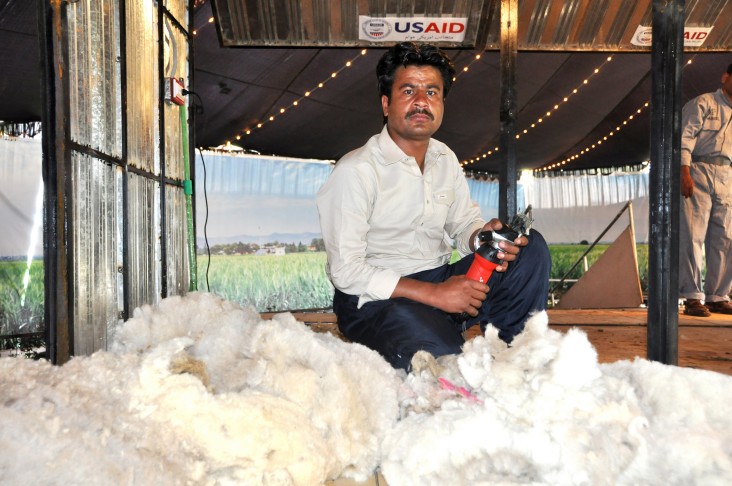
Sept. 2014—Surrounded by the “baa-baa” of bleating sheep, a master shearer in Pakistan clips slowly and confidently with his oversized scissors through one cluster of fleece after another. Two of his assistants keep the sheep secured and firmly pressed against the floor. Forty-five minutes later, the sheep has been shorn. But with the introduction of mechanized shears, a similar sheep is shaved within seven minutes, saving time, reducing costs and causing less stress for shearers and sheep alike.
USAID’s Balochistan Agriculture Project introduced mechanized shears in remote areas of Balochistan, Pakistan, in May of this year. The new equipment and practices reduce the time to shear a sheep sixfold and produce higher quality wool with longer, more even-length fiber, earning the farmers more money.
The wool industry is an important source of income in the dry and mountainous province of Balochistan, which has an estimated 12 million sheep but currently only brings in $5 million annually from the sale of wool. Inhabitants of this huge, sparsely populated and undeveloped region depend on agriculture for their livelihoods.
Modernizing wool production practices—everything from classifying color-graded wool, grading fleeces, washing wool before sale, and producing more even-length fiber through mechanical shearing—is one way USAID and its implementing partner, the United Nations Food and Agriculture Organization, are working to tackle poverty and boost food security among farmers in Balochistan’s remote communities.
The project also provides income for women who can work from home to wash, sort and bundle the fleece. These improved practices have the potential to increase the province’s annual revenue from the industry fourfold, to $20 million.
“The months of April and August are fantastic times,” said sheep shearer Abdul Khaliq. “The community is vibrant and active with the hum of shearing machines, bleating sheep, dogs barking and shearers shouting 'I am done … bring the next lot.’” He adds: “The whole process has become so simple, now I can shear more than 50 sheep in one day. In the past, I used to shear with scissors and was hardly able to shear 10 to 12 sheep a day.”
The project imports the necessary equipment through a local business and constructed a sharpening station to keep the combs and cutters in excellent working condition. A cadre of master shearers trains other farmers who are interested in purchasing and operating a mobile shearing shed on a commercial basis.
The project also developed a business model to support the adoption of this new technique. To further scale up, a prototype mobile shearing shed was provided to the Government for replication throughout the country.
As marketing and distribution are important to the success of any product for sale, USAID linked wool farmers with traders in different parts of the country.
“We are very pleased to buy wool from Balochistan shorn this way,” says wool trader Malik Furrukh Nawaz from Galaxies Logistic International, a Karachi-based company. “The even length of the fleece as a result of this new technique and equipment means that we are now able to expand our export markets to India, China and Egypt.”
Innovative techniques such as mechanized shearing, washing sheep before shearing, and sorting wool during the shearing process are essential to increased productivity, income and growth for the Balochistan wool industry. And farmers like Khaliq are already benefitting.
The Balochistan Agriculture Project, which runs from January 2009 to December 2015, aims to increase the incomes of more than 14,000 households in the area through new technology, improved management practices, and new varieties of crops and livestock.
LINKS
Follow @USAID_Pakistan; on Facebook, on Flickr; on YouTube







Comment
Make a general inquiry or suggest an improvement.